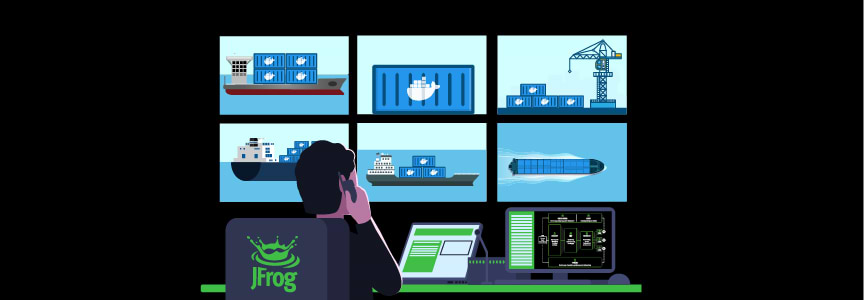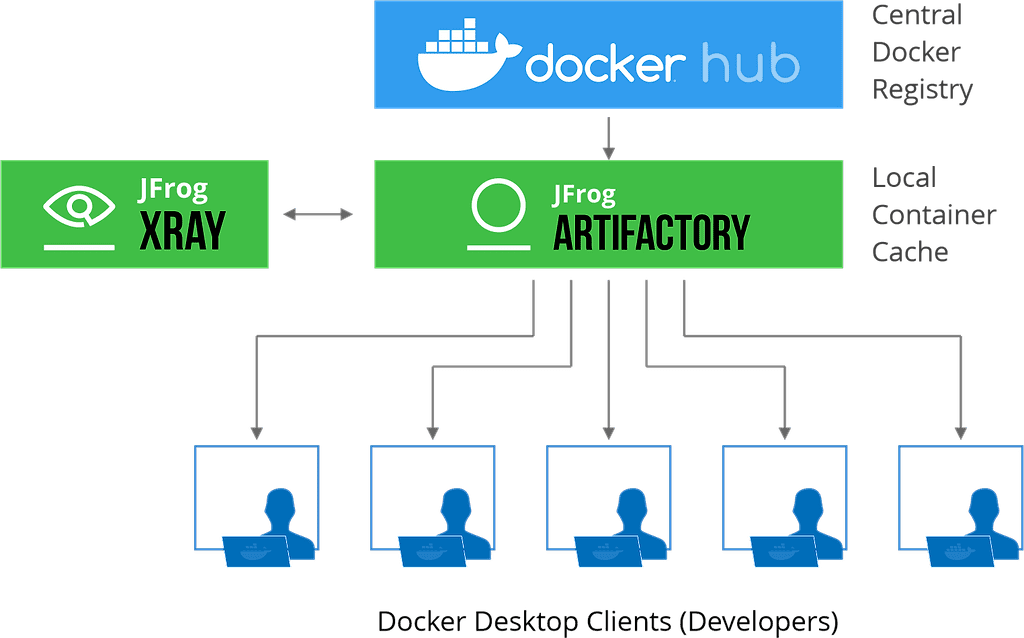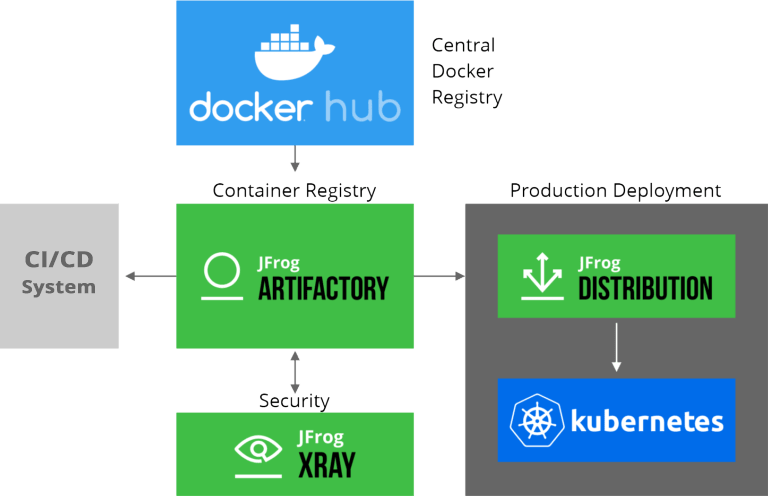Our Groundbreaking Partnership with Docker Is a Boon for DevOps Teams

Today we’re announcing a big move that will yield substantial, concrete benefits for our customers and for the entire DevOps community: A groundbreaking partnership with Docker that exempts Cloud users of the JFrog DevOps Platform from image-pull rate limits on Docker Hub.
This agreement further boosts JFrog’s vibrant ecosystem of integration partners, built on the “too integrated to fail” principle that’s been a pillar of our company since its founding. Our priority is to streamline, automate and simplify the way DevOps teams work, and pursuing integration partnerships such as this one is at the heart of that core JFrog value.
The first milestone of this partnership provides developers using the platform’s JFrog Artifactory — our universal software package management solution — with unlimited, high-performant access to Docker Hub and to Docker Official Images to simplify cloud-native application development.
With this partnership, JFrog and Docker will deliver:
- An optimal, unparalleled developer experience when working with containers
- Freedom and flexibility when choosing toolsets
- Dedicated channels to support mutual customers
- Enterprise-grade reliability and performance to streamline cloud-native application delivery
A Bit of Context
Last year, Docker announced new consumption-based limits on container images pulled from Docker Hub. Specifically, anonymous free users are limited to 100 pulls per six hours, and authenticated free users to 200 pulls per six hours.
Millions of users in thousands of businesses, including the majority of the Fortune 100, host and manage their software artifacts and container images in JFrog Artifactory. These JFrog customers often mirror container images hosted on Docker Hub. Right away, we made sure our customers were informed about these new policies, and communicated with them in various ways, explaining the implications of the changes.
Specifically, we said that for organizations that rely on Docker Hub for their Docker registries, the new policy could impact the productivity of enterprise DevOps teams, and we outlined ways in which JFrog Artifactory could be leveraged to help control costs.
Making It All Better
However, we wanted to go further and remove any friction our customers could encounter. That’s what this agreement does, by ensuring that Cloud users of the JFrog Platform, including those who use the free subscription offered on AWS, GCP, and Azure, won’t face Docker Hub image-pull limits.
At a high-level, this lowers your organization’s business risk. That’s because lacking a reliable source of binaries for your critical production applications puts your business in a precarious position. By giving you unfettered access to the Docker Hub images you need, this agreement prevents interruptions in your build and production environments, and provides business continuity, speed and efficiency.
Let’s look in more detail at how this partnership changes the game for our customers by examining two key use cases.
JFrog Artifactory as a pull-through cache for Docker Hub
By taking advantage of JFrog Artifactory as a local container cache, coupled with limitless Docker Hub access, enterprise developers will reap a variety of benefits, including:
- A boost to developer productivity. Enterprise developers will get faster and more responsive access to containers by standing up JFrog Artifactory as their local container cache with no Docker Hub limitations.
- Optimized usage of IT resources. By caching Docker images locally on JFrog Artifactory, external traffic on the developers’ networks is reduced, lowering their companies’ bandwidth consumption. In addition, it lessens the load on Docker Hub’s infrastructure, which benefits the overall DevOps community.
- Enhanced code hygiene and security. By leveraging JFrog Xray, our vulnerability scanning tool, developers get continuous, comprehensive scanning of the images they pull from Docker Hub. JFrog Xray, which is natively integrated with JFrog Artifactory, detects vulnerabilities and license compliance issues in images, containers and other artifacts, allowing organizations to “shift left” by giving their developers the tools to take remediation action early and often.

Artifactory as a container registry
With JFrog Artifactory as your container registry for storing the images that are going into your production, you get various advantages, including:
- Reliability and scalability. For enterprises that do continuous delivery and have a heavy volume of production deployments, this gives them high availability of critical images pulled from Docker Hub, as well as a reliable and repeatable system for distributing binaries.
- Tighter production security. With JFrog Artifactory and JFrog Xray, you get a single pane of glass view into your artifacts’ security and open source license compliance issues across your DevOps pipeline, including production.
- Full visibility and actionable insights. JFrog lets you trace the security and compliance of all your packages and images, so you can take appropriate actions quickly and ensure the safety and integrity of your applications, as well as fulfill your internal and external auditing requirements.

Send Us Your Feedback
But of course, it’s not just about Cloud. While JFrog SaaS users will enjoy all of the partnership benefits, JFrog is also assisting our self-hosted customers directly in the Platform UI, providing notification and instruction on authenticating directly with Docker Hub to avoid any anonymous user restrictions.
In summary, our customers now can focus on their work instead of having to spend time and energy managing their pulls of container images from Docker Hub.
As always, we welcome your feedback about this agreement, especially ways in which it benefits you, and ideas for potentially expanding and improving it.




